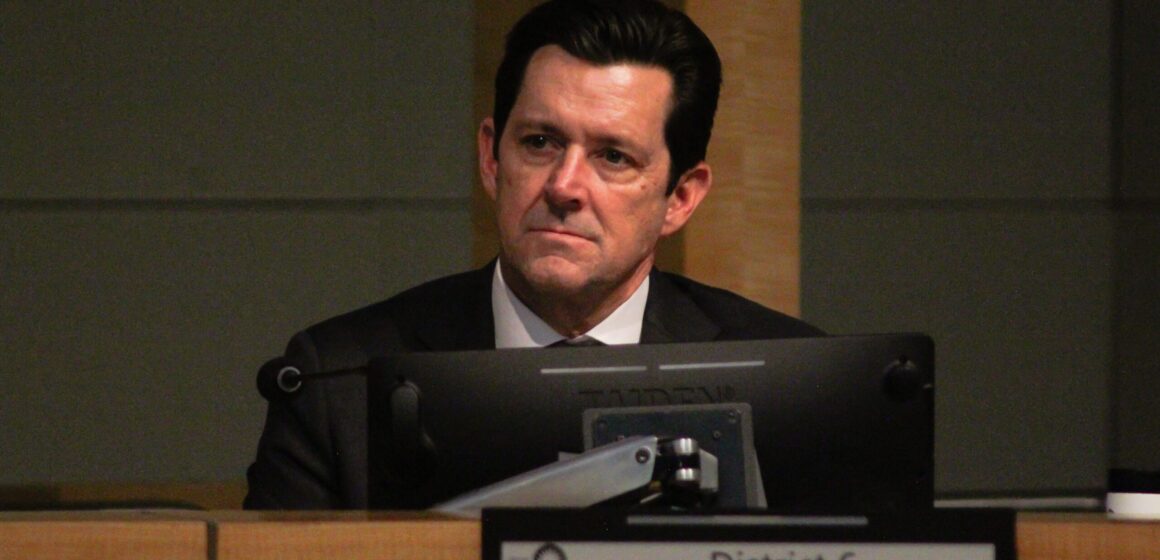The San Jose Police Department pays $55,000 a month to rent an evidence warehouse on Monterey Road. The owner: a San Jose official who votes on police spending.
District 6 Councilmember Michael Mulcahy is the managing partner of his private, family-owned real estate firm SDS NexGen Partners, which has leased the warehouse to the city since 2003, according to records obtained by San José Spotlight. The agreement was inked decades before Mulcahy took office this year, and he’s been upfront about it in state-required financial disclosures. But in his new role, Mulcahy is tasked with annually voting on police department budgets, which could impact the use of his property.
It’s raising questions about the fine lines of San Jose’s and California’s conflict of interest laws.
The issue of Mulcahy’s property did not come up during his first budget vote as a councilmember in June, and he did not recuse himself. San Jose’s code of ethics bars all officials from using their position to affect decisions where they have a financial interest.
For now, the ethical quagmire has the city’s top lawyers scratching their heads.
“We haven’t had a chance to vet this through,” Rosa Tsongtaatarii, a lawyer in the City Attorney’s Office, told San José Spotlight. “It could be a financial conflict of interest, but we haven’t pinpointed whether it may fall under an exception (to the city’s code of ethics) — or whether we just need to modify the voting process that would still allow him to participate in the larger police and city budget vote, if there is a way to segment it out.”
Mulcahy said he intends to balance his duties as a public servant with the need to shield any vote from ethical concerns.
“Actions on the city budget impact all of San Jose, so as we enter the next budget cycle and consider action on the lease or budget I will consult with the city attorney’s office on an approach to participation that would comport with conflict rules,” Mulcahy told San José Spotlight.
Tsongtaatarii said the city may have to consult with the state Fair Political Practices Commission (FPPC), which investigates violations of political transparency laws and warns politicians about potential infractions.
“We would probably try to seek some advice, whether formal or informal, from the FPPC,” Tsongtaatarii said. “Certainly before the next budget cycle.”
Political ethics and government legal experts agree Mulcahy’s upfront disclosure about the property — and the timing of the agreement well before he took office — don’t point to any abuse of his position for personal enrichment.
“If a city lease or contract involving an elected official was approved before that official assumed office, no conflict arises from the original approval,” Sean McMorris, a political transparency expert with California Common Cause, told San José Spotlight. “However, if the lease or contract is renewed or amended while the official is in office, the official must recuse from any discussion, influence or vote on the matter because the transaction may constitute a disqualifying financial interest — i.e. bestow a personal benefit to the official.”
Records indicate the most recent adjustment to the contract with Mulcahy’s firm occurred in 2022, three years before he was sworn in at the beginning of this year. The lease agreement runs through 2031, by which point the city will be paying Mulcahy’s firm more than $65,000 in monthly base rent.
“With regard to a broader budget item, it is less clear to me if the law would require recusal,” McMorris said. “My inclination is yes, but it may be considered an indirect or non-explicit conflict, in which case the FPPC would likely use what’s called materiality standard to determine if a reasonably foreseeable conflict exists that is more than hypothetical or theoretical.”
McMorris called on the city to carve Mulcahy’s property out of future budget votes.
“It might be prudent to pull the specific item from the budget and vote on it separately with any conflicted or potentially conflicted parties recusing from the vote, as well as from influencing the matter in any way outside of a public forum,” he said.
 John Sims, professor emeritus at the McGeorge School of Law at the University of the Pacific in Sacramento, said it’s a complex illustration of how local government and private stakeholders can become entangled.
John Sims, professor emeritus at the McGeorge School of Law at the University of the Pacific in Sacramento, said it’s a complex illustration of how local government and private stakeholders can become entangled.
“There’s a reason they’re on the City Council, and it may reflect that they’re not the most anonymous person in town,” Sims told San José Spotlight. “They’re not trying to exploit their position — but it’s interesting to hear, from an ethical standpoint, how do you deal with that?”
Davina Hurt, the new government director for Santa Clara University’s Markkula Center for Applied Ethics, said Mulcahy’s situation could end up sharpening the city’s ethics rules.
“Through appearances of conflict, you can find good ways to create policy that furthers transparency and good governance,” Hurt told San José Spotlight.
Contact Brandon Pho at [email protected] or @brandonphooo on X.



Leave a Reply
You must be logged in to post a comment.